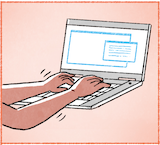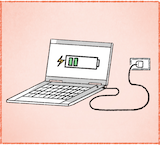


นี้คืออี่หยัง นี้คือโน่ดบุ่ก เป็นโน่ดบุ่ก เอาไว้ใซ้งาน ค้ายๆ กับค็อมพิวเต้อ แต่ว่าอันนี้เป็นโน่ดบุ่ก สามาดพกพาได้ สามาดถือไปใสกะได้
สิต่างจากค็อมพิวเต้อ แต่ว่าใซ้งานค้ายๆ กับค็อมพิวเต้อ คือๆ กับค็อมพิวเต้อนั้นหละ แต่อันนี้สามาดถือไปใซ้งานทางอื่นได้ สามาดเคื้อนที้ได้
แต่ว่าค็อมพิวเต้อบ่สามาดเคื้อนที้ได้ ค็อมพิวเต้อเอาไว้แต่ไว้บ้าน หลือเอาไว้หม้องแห่งงานซื่อๆ บ่สามาดถือไปนำได้
ส่วนปะกอบของโน่ดบุ่กนี้ กะสิมีหน้าจอพ้อม มีแป้นพิมพ้อม หลือมีเมาพ้อม แต่ว่าในลูบนี้เฮาแนมบ่เห็นเมาเนาะ
กะสิสามาดใซ้งานได้คือค็อม หลือสามาดใซ้งานค้ายๆ กับค็อมพิวเต้อได้คือกันทุกอย่าง
โน่ดบุ่กอันนี้สามาดใซ้งาน หลือเฮ็ดได้คือกันกับค็อมพิวเต้อ คือกันทุกอย่าง
โน่ดบุ่กอันนี้มีลาคาแพงบ่ กะแพงอยู่ กะแพงคือกัน แพงคัก
แต่ว่า กะแล้วแต่ยี่ห้อ แล้วแต่ลุ้นของมัน ลุ้นแพงกะแพง ลุ้นถืกกะถืก ขั้นลุ้นแพงหลาย กะสามาดใซ้งานได้โดน ขั้นลุ้นถืกหลาย กะสามาดใซ้งานได้แป่บเดียว หลือสามาดใซ้งานได้บ่โดนนั้นหละ
14
เขากำลังเฮ็ดหญัง เขากำลังเหล้นโน่ดบุ่ก เขากำลังใซ้งานโน่ดบุ่กอยู่
เขาเหล้นโน่ดบุ่กเฮ็ดหญัง อันนี้กะบ่ฮู้คือกัน จักว่าเขาเฮ็ดงาน หลือเหล้นเกม หลือเฮ็ดอี่หยังกะบ่ฮู้ แต่ว่า ฮู้แต่ว่าเขาใซ้งานโน่ดบุ่กนี้อยู่ เขากำลังเหล้นโน่ดบุ่กนี้อยู่
15
เกิดอี่หยังกับโน่ดบุ่กอันนี้ กะบ่ได้เกิดอี่หยังขึ้น กะฮู้แต่ว่าเขากำลังซ่าดแบ็ดอยู่ ซ่าดแบ็ดโน่ดบุ่กอันนี้อยู่
เป็นหญังเขาคือซ่าดแบ็ด โน่ดบุ่กอันนี้อาดสิแบ็ดเบิด หลือบ่มีแบ็ดเตอลี้แล้วกะได้ เขากะเลยซ่าดแบ็ด เพื่อที่สิสามาดใซ้งานได้
ขั้นโน่ดบุ่กอันนี้บ่มีแบ็ดเตอลี้ หลือบ่มีแบ็ด กะบ่สามาดเหล้นได้ หลือบ่สามาดใซ้งานได้
เพาะสะนั้นแล้ว ขั้นสิเหล้นโน่ดบุ่กอันนี้ โน่ดบุ่กอันนี้ต้องมีแบ็ด หลือมีแบ็ดเตอลี้
ขั้นโน่ดบุ่กอันนี้บ่มีแบ็ดเตอลี้ เฮากะต้องซ่าดแบ็ด ซ่าดแบ็ดกับไฟฟ้า หลือมีปั่กไฟเซี้ยมจากโน่ดบุ่กกับปั่กไฟของเฮา หลือปั่กไฟอยู่บ้าน
Link to overview page
Link to dictionary
| Isaan | Pronunciation | Tones | Thai | English/Notes |
|---|---|---|---|---|
| นี้ | ni: | HF | นี้ | 1. this 2. here |
| คือ | khʉ: | HR | คือ | 1. to be, to resemble, like, as 2. why {บักหล้าคือบ่เก็บโต่ะแน่ = [addressing a young boy] Why haven't you cleared the table?} |
| อี่หยัง | i:-yaŋ | H-M | อะไร | 1. what {นี้คืออี่หยัง = What is this?} {มื้อนี้เจ้าเฮ็ดอี่หยัง = What are you doing today?} {กินเข้างายกับอี่หยัง = What did you have for breakfast?} 2. something, anything, (in negations) nothing {บ่ต้องเฮ็ดอี่หยังอีกเลยนอกจากใส่ปุย = [we] don't need to do anything besides adding fertilizer} |
| โน่ดบุ่ก | no:t-buk | H-H | โน้ตบุ๊ก | notebook, laptop |
| เป็น | pen | M | เป็น | 1. to be, to exist 2. to be able to 3. to suffer, sth. happens to 4. เป็นหญัง[...]คือ in initial position: why? {เป็นหญังเขากะคือแปงฟัน = Why is he brushing his teeth?} {เป็นหญังเคี่ยงบินมันคือสิตก = Why is the airplane falling down?} |
| เอา | ao | M | เอา | to take, to give {เขากำลังเอาก่องไปซั่ง = he's taking the boxes to weigh them} {หมอกำลังเอายาให้คนป่วยกิน = the doctor is giving medicine to the patient} {เอาไว้ถ้า = is for, is used for, has the purpose of} |
| ไว้ | wai | HF | ไว้ | 1. to keep, to put, to place, to retain, to save, to reserve {เขาเอาหัวของเขาไว้ใส = Where does she put her head?} {หมาสิเลี้ยงไว้บ้าน = dogs are kept/raised in the house} {ไก่เลี้ยงไว้ในคอก = chicken are kept/raised in a coop} {หน้ามันบังไว้ = the face is covered/not visible} {เขาเอาโทละสับวางไว้หู = he holds the phone to his ear} 2. for {นาลิกาปุกมีไว้เฮ็ดหญัง = What is an alarm clock for?} {หม้อเอาไว้เฮ็ดแนวกิน = a pot is used to make food} {ก่องเอาไว้เฮ็ดหญัง ก่องเอาไว้ใส่ของ = What is the box for? It's for putting in stuff.} Notes: see also ไว้ถ้า |
| ใซ้งาน | sai-ŋa:n | HF-HR | ใช้งาน | to use, to put to use |
| ค้าย | kha:i | HF | คล้าย | to resemble, to be similar, to be alike {ทัพพีเป็นค้ายๆ กับซ้อน = a ladle is similar to a spoon} |
| กับ | gap | M | กับ | 1. and {ลุงกับป้า = uncle and aunt} {กวยเตียวหมูกับกวยเตียวไก่ = noodle soup with pork and noodle soup with chicken} 2. with, to {ค้ายๆ กับคำว่า ... = similar to the word ...} 3. prefix in front of foods {กับเข้า = side dishes eaten with rice} {เขากินกับกวยเตียว = he's eating noodle soup} |
| ค็อมพิวเต้อ | khom-piu-tə: | HR-HR-HF | คอมพิวเตอร์ | computer |
| แต่ว่า | tɛ:-wa: | H-H | แต่ว่า | 1. but 2. only {ฮู้แต่ว่าเขายืนอยู่พุเดียว = I only know that he's standing there by himself} |
| อัน | an | M | อัน | 1. thing, object 2. general clf. for objects |
| สามาด | sa:-ma:t | M-HF | สามารถ | can, to be able |
| พกพา | phok-pha: | H-HR | พกพา | to carry (on one's person) |
| ได้ | dai | HF | ได้ | 1. can 2. to get, to obtain 3. before verb: indicating past tense 4. บ่ได้ + verb: not |
| ถือ | thʉ: | M | ถือ | 1. to hold 2. to carry 3. to regard as, to consider {สี่สิบองสาถือว่าฮ้อน = 40 degrees Celsius is considered hot} |
| ไป | pai | M | ไป | 1. to go 2. auxiliary indicating action extending into the future |
| ใส | sai | M | (ที่)ไหน | 1. where? {สิไปใส = Where are [you] going?} {มาแต่ใส = Where are [you] coming from?} {กะทะอยู่ใส = Where's the pan?} 2. somewhere, anywhere {ใสกะได้ = anywhere, wherever you like} |
| กะ | ga | M | ก็ | 1. then, consequently 2. also |
| สิ | si | M | จะ | future tense auxiliary {เขากำลังสิตื่น = he's about to wake up} {สิไปตะหลาด = [I'm] going to the market} |
| ต่าง | ta:ŋ | H | ต่าง | 1. to differ 2. foreign |
| จาก | ja:k | LF | จาก | 1. from {... เฮ็ดมาจากอี่หยัง = ... is made from what?} 2. to depart |
| นั้นหละ | nan-la | HF-M | นั่นแหละ | auxiliary for emphasis at the end of a phrase |
| แต่ | tɛ: | H | แต่ | 1. but {แต่บ่ต่างกันหลาย = but not very different} {แต่บ่ลู้ว่าเขาญ่างมาแต่ใส = but [I] don't know where he's coming from, see also: แต่ว่า} 2. only {ตอนนี้มีแต่ขี้ฝ้า = now there are only clouds} |
| ทาง | tha:ŋ | HR | ทาง | 1. way, direction {พุหญิงกะสิไปทางหนึ่ง พุซายกะสิไปอีกทางหนึ่ง = the woman goes one way, the man another way} {ตะเว็นไปทางใด = Where has the sun gone?} {เขาถีบจักกะย๊านไปทางหน้า = he's biking on/onward/forward} {มาเว้า มาว่าเฮาในทางที่บ่ดี = he's scolding [me], he's talking to me improperly} 2. by, through, via etc. {เว้าทางโทละสับ = to talk on the phone} |
| อื่น | ʉ:n | H | อื่น | other |
| เคื้อนที้ | khʉ:an-thi: | HF-HF | เคลื่อนที่ | to move |
| บ่ | bɔ: | H | ไม่ | 1. no, not 2. question particle, transforming a statement into a question Notes: spelling exception in line with common usage on social media |
| บ้าน | ba:n | HF | บ้าน | 1. house, home 2. village (also used as a prefix before the name of a village) 3. home country, home region {บ้านเฮาเฮ็ดเข้าจั่งใด = How do we plant rice in Isaan/Thailand?} |
| หลือ | lʉ: | M | หรือ | or |
| หม้อง | mɔŋ | LF | ที่, แห่ง, บริเวณ | 1. place, area {หลายที่หลายหม้อง = in many places} {หม้องใดหม้องหนึ่ง = some place} 2. clf. for places |
| แห่ง | hɛŋ | H | แห่ง | clf. for places {โลงเลียนแห่งนี้ = this school} {หม้องแห่งงาน = workplace} |
| งาน | ŋa:n | HR | งาน | 1. task, work 2. festival, ceremony |
| ซื่อๆ | sʉ: | H | เฉยๆ | 1. just so 2. so-so |
| นำ | nam | HR | 1. at, in 2. with, together with {บ่สามาดถือไปนำได้ = [you] can't carry it around} {กินบักแตงโมนำเฮาบ่ = Will you eat watermelon with me?} 3. to lead, to accompany, to go with {เด็กน้อยญ่างไปนำแม่ = the daughter follows her mother} |
|
| ส่วนปะกอบ | su:an-pa-gɔ:p | H-M-LF | ส่วนประกอบ | component, element |
| ของ | khɔ:ŋ | M | ของ | of, belonging to |
| มี | mi: | HR | มี | 1. to have 2. there is |
| หน้าจอ | na:-jɔ: | LF-M | หน้าจอ | monitor, screen |
| พ้อม | phɔ:m | HF | พร้อม | at the same time, also, too {มีตะเว็นพ้อม = the sun's out, too} {กะทะมีด้ามพ้อม = the pan has also a handle} |
| แป้นพิม | pɛ:n-phim | HF-HR | แป้นพิมพ์ | keyboard |
| เมา | mao | HR | เมาส์ | computer: mouse |
| ใน | nai | HR | ใน | in, within |
| ลูบ | lu:p | HF | รูป | 1. picture, image, photo 2. form, shape 3. clf. for pictures, images, photos |
| เฮา | hao | HR | เรา | 1. personal pronoun: we 2. personal pronoun: I |
| แนม | nɛ:m | HR | มอง | to look, to glance, to stare {เขากำลังยืนแนมก้อนหินอยู่ = he's standing and looking at the stone/rock} {ข้างหนึ่งแนมเห็น อีกข้างหนึ่งแนมบ่เห็น = [we] see one side, [we] can't/don't see the other side} |
| เห็น | hen | M | เห็น | to see |
| เนาะ | nɔ | H | เนาะ | final particle: makes the statement softer, looking for agreement |
| ค็อม | khom | HR | คอมพิวเตอร์ | computer |
| คือกัน | khʉ:-gan | HR-M | เหมือนกัน | 1. also, likewise, similarly {ยินดีที่ได้ฮู้จักคือกันคับ = Nice to meet you too!} 2. in negative sentences: either {บ่ลู้คือกัน = I don't know either} {จักคือกัน = I don't know (either)} |
| ทุก | thuk | H | ทุก | every Notes: also pronounced ทุ as in ทุมื้อๆ = everyday, always |
| อย่าง | ya:ŋ | H | อย่าง | type, kind, sort, category |
| เฮ็ด | het | H | ทำ | to do, to make |
| ลาคา | la:-kha: | HR-HR | ราคา | price |
| แพง | phɛ:ŋ | HR | แพง | 1. expensive 2. dear |
| อยู่ | yu: | H | อยู่ | 1. to be (located) at 2. yet, still 3. auxiliary indicating continuous or progressive action {ทอดปาอยู่ในกะทะ = (in the process of) frying a fish in the pan} {แม่กำลังเมี้ยนเฮียนอยู่ = mother is cleaning/tidying up the house} |
| คัก | khak | H | intensifier: very, very much | |
| แล้วแต่ | lɛ:o-tɛ: | HF-H | แล้วแต่ | up to, depending on |
| ยี่ห้อ | yi:-hɔ: | H-LF | ยี่ห้อ | brand, brand name Notes: see also ยี้ฮ้อ |
| ลุ้น | lun | HF | รุ่น | 1. model, version 2. generation, age |
| มัน | man | HR | มัน | it (also used to refer to people) |
| ถืก | thʉ:k | LF | ถูก | cheap, inexpensive |
| ขั้น | khan | LF | เมื่อ | when, if |
| หลาย | la:i | M | เยอะ, มาก | many, much, very |
| โดน | do:n | M | นาน | time: long |
| แป่บเดียว | pɛp-di:ao | H-M | แป๊บเดียว | just a moment |
| เขา | khao | M | เขา | personal pronoun: he, she |
| กำลัง | gam-laŋ | M-HR | กำลัง | auxiliary indicating continuous or progressive action |
| หญัง | ɲaŋ | M | อะไร, เป็นหญัง = ทำไม | 1. what {เขากำลังเฮ็ดหญัง = What is he doing?} {ธูปเอาไว้เฮ็ดหญัง = What are incense sticks for?} 2. something, anything, (nothing) 3. เป็นหญัง[...]คือ in initial position: why {เป็นหญังเขาคือใส่บักพิกลงไปในกวยเตียว = Why is he putting chili in [his] noodle soup?} {เป็นหญังหน้าต่างมันคือเปิด = Why is the window open?} {เป็นหญังมันคือมีควนไฟ = Why is there smoke?} |
| เหล้น | len | LF | เล่น | 1. to play, to enjoy oneself with, to do something for pleasure {เหล้นลูกบอน = to play ball} {เหล้นเกม = to play a game/games} {เหล้นน้ำ = to play with/in the water} {นั่งเหล้น = to sit} {กินเหล้น = to eat (as a snack), to snack} {เหล้นโน่ดบุ่ก = to use a laptop (for entertainment or work)} 2. to drop by, to spend time with, to come to visit {บ่ได้มาเฮ็ดหญัง มาเหล้นซื่อๆ = I've not come to do anything in particular, I'm just dropping by} |
| ฮู้ | hu: | HF | รู้ | 1. to know 2. to understand Notes: equivalent to ลู้ |
| จัก | jak | M | จัก | 1. answer to a question: [I] don't know, don't know exactly, [I'm] not sure {พุซายคนนี้เขาเถ้าไป่ จัก จักเถ้าหลือบ่เถ้า เบิ่งบ่ค่อยออก = Is this man here already old? I don't know. I can't see clearly whether he's old or not.} {เขาเว้ากันอยู่ใส จักคือกัน = Where are they talking? I don't know either.} 2. exact(ly), what exactly {จักต้มอี่หยังกะบ่ฮู้ = I don't know what (exactly) he is cooking} {บ่ลู้คือกันจักปาอี่หยัง = I don't know either what kind of fish this is} 3. how much/many? {ต้นไม้มีจักต้น = How many trees are there?} {ตอนนี้จักโมงแล้ว = What time is it now?} {มือของเฮานี้สิมีจักนิ้ว = How many fingers do our hands have?} 4. a bit, a little bit {จักหน่อย/จักหน่อยหนึ่ง = a bit, a little bit} |
| ว่า | wa: | H | ว่า | 1. that, as {คำว่า X = the word X} 2. to say |
| เฮ็ดงาน | het-ŋa:n | H-HR | ทำงาน | to work |
| เกม | ge:m | M | เกมส์ | game |
| เกิด | gə:t | LF | เกิด | 1. (often together with ขึ้น) to happen, to arise, to take place {เกิดอี่หยังขึ้น = what is happening?} {บ่มีหญังเกิดขึ้น = nothing's happening} 2. to be born 3. to grow {หนวดกะคือสิเกิดอยู่ใต้ดัง = a moustache grows below the nose} |
| ขึ้น | khʉn | LF | ขึ้น | 1. to go up, to increase 2. sun: to rise {ตะเว็นกำลังขึ้น = the sun is rising} 3. more 4. bus/train etc.: to get on, to board {พุโดยสานขึ้นลดไฟเบิดแล้ว = all passengers have boarded the train} |
| ซ่าด | sa:t | H | ชาร์จ | to charge (a battery, a device) Notes: also frequently pronounced ช่าด [cha:t] |
| แบ็ด | bɛt | M | แบตเตอรี | battery Notes: see also แบ็ดเตอลี้ |
| อาด | a:t | LF | อาจ | 1. might, may, will 2. likely |
| เบิด | bə:t/bət | LF/M | หมด | 1. completely, totally, entirely {เทิงเบิด = all of them} {เบิดมื้อเบิดค่ำ = [all] day and night} {ขั้นพุโดยสานลงลดไฟเบิดแล้ว [...] = when all passengers have disembarked […]} {เขากินเบิดบ่ = Has he eaten all of it?} 2. to be finished, to be exhausted, to come to an end, to have no more {โน่ดบุ่กแบ็ดเบิด = the notebook is out of battery/the notebook needs recharging} |
| แบ็ดเตอลี้ | bɛt-tə:-li: | M-M-HF | แบตเตอรี | battery Notes: see also แบ็ด |
| แล้ว | lɛ:o | HF | แล้ว | 1. finished 2. already 3. and then, and next (especially แล้วกะ) 4. auxiliary for past tense |
| เลย | lə:i | HR | เลย | 1. futher on, beyond, past {เข็มน้อยเลยเลขสิบสองไป = the minute hand has passed number twelve} 2. too much 3. at all 4. definitively 5. completely, utterly |
| เพื่อที่ | phʉ:a-thi: | H-H | เพื่อที่ | in order to, so that Notes: the vowel เอือ is likely to be a Thai loan |
| เพาะสะนั้นแล้ว | phɔ-sa-nan-lɛ:o | H-M-HF-HF | เพราะฉะนั้นแล้ว | therefore, for that reason, consequently Notes: pronunciation: also realized as เพาะฉะนั้น |
| ต้อง | tɔŋ | HF | ต้อง | to have to, must |
| ไฟฟ้า | fai-fa: | HR-HF | ไฟฟ้า | electricity |
| ปั่ก | pak | H | ปลั๊ก | 1. plug 2. socket |
| ไฟ | fai | HR | ไฟ | 1. fire, flame 2. electricity, power 3. light |
| เซี้ยม | si:am | HF | เชื่อม | to connect, to join Notes: pronunciation: also realized as เชื้อม (HF) |